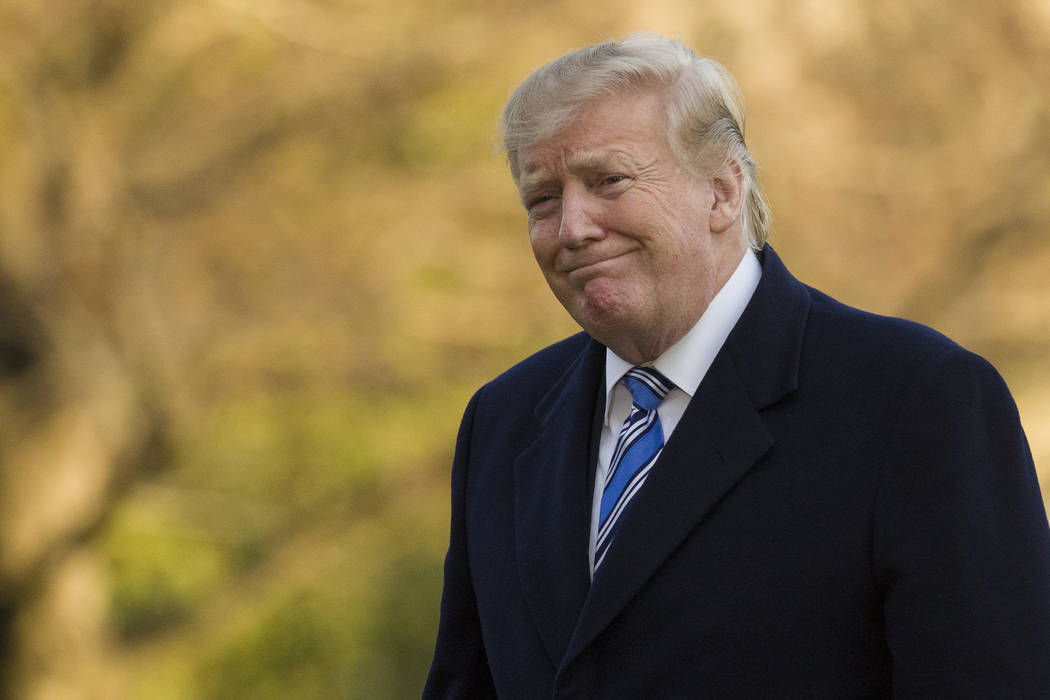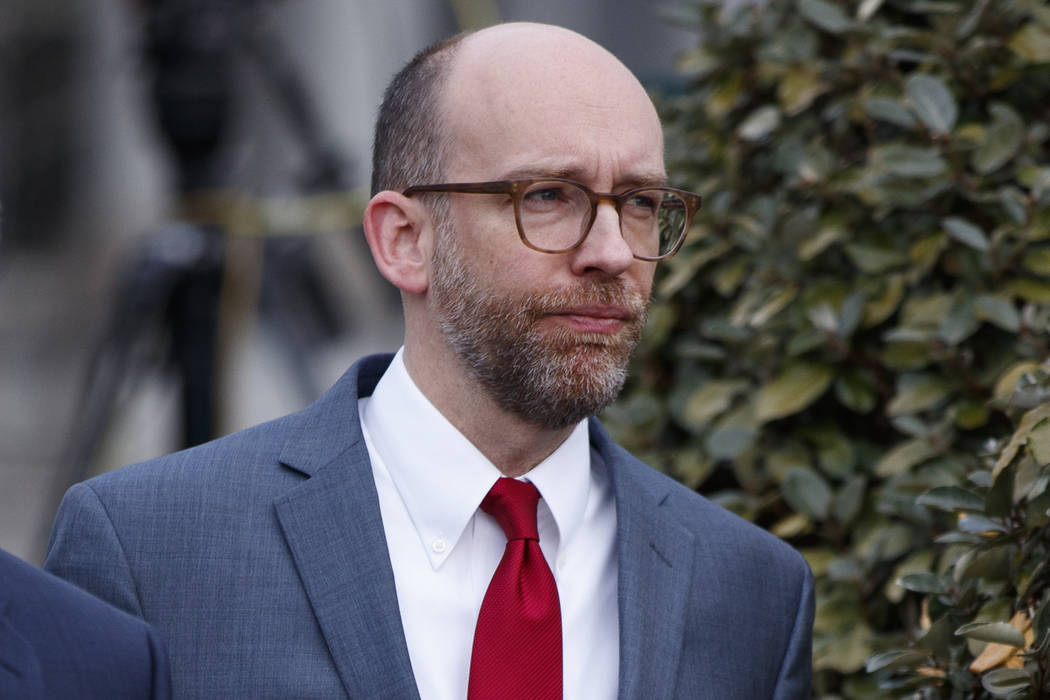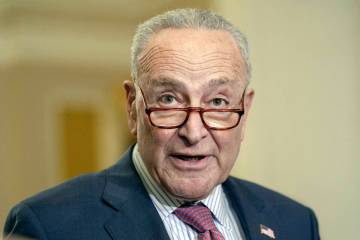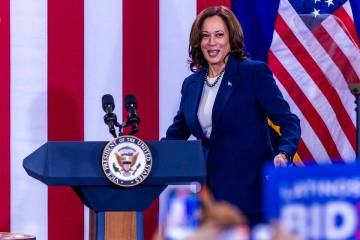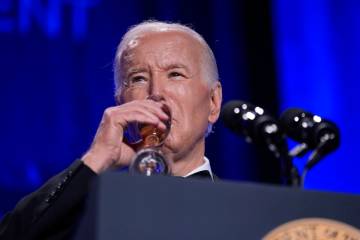Trump’s $4.7 trillion budget offers more money for military, border wall
WASHINGTON — President Donald Trump released a $4.7 trillion budget Monday — with more money for the military and the president’s signature wall on the Southwest border and less money for domestic programs.
The Trump spending plan for fiscal year 2020 proposes to cut non-defense domestic spending by 5 percent in an attempt to balance the budget in 15 years, while providing $750 billion for the U.S. military and another $8.6 billion for the border wall.
It also includes $116 million to restart the licensing process for a proposed nuclear waste repository at Yucca Mountain and fund an interim storage program for the growing stockpile of waste.
What president’s propose, Congress routinely disposes. Trump’s proposal for the fiscal year that begins Oct. 1 sets up a showdown with Congress over priorities, especially as he reignites his push for money to build the U.S-Mexico border wall.
Even before the release of the spending plan, House Speaker Nancy Pelosi, D-Calif., and Senate Minority Leader Chuck Schumer, D-N.Y., released a statement warning that the last government shutdown began because Congress would not fund Trump’s border wall. It ended, they said, when Trump “was forced to admit defeat and reopen the government. The same thing will repeat itself if he tries this again. We hope he has learned his lesson.”
While the budget seeks more money for a border wall, Trump included a conciliatory gesture in his budget message that recognized “our obligation to the millions of immigrants living in the United States today who followed the rules and respected our laws.”
As a candidate in 2016, Trump told the Washington Post that he could reduce the deficit in eight years. Trump’s first two budget blueprints moved the target date for eliminating the deficit back to 10 years. With this budget, Trump would extend the timeline for eliminating the deficit to 15 years.
The national debt has risen from $19.9 trillion when Trump assumed office to more than $22 trillion.
Rising annual deficits
During a press briefing Monday, Russell Vought, the acting director of the Office of Management and Budget, acknowledged, “Annual deficits are continuing to rise and will exceed a trillion a year. And it’s projected that interest payments on the national debt will exceed military spending by 2024.”
Vought maintained that Trump’s goal of eliminating the deficit was hampered by a struggling economy and a military in need of a boost. He blamed Congress for “ignoring the president’s spending reductions for the last two years. It’s only now in our third budget that they’re willing to have a conversation about the national debt.”
Under Trump’s proposal, the budget deficit is projected to hit $1.1 trillion next year — the highest in a decade.
The Committee for a Responsible Budget tweeted, “If the past two years are any indication, this #budget will be followed by more debt, not debt reduction.”
“The budget achieves some deficit reduction on paper, but it does not address the key drivers of our debt and relies on unlikely assumptions,” said Michael A. Peterson, CEO of the Peter G. Peterson Foundation.
Peterson faulted the OMB plan for focusing on non-defense discretionary programs, which are “not a driver of our growing debt,” for using overly optimistic forecasting and using “sleight-of-hand” by siphoning money “specified for fighting wars to cover annual defense spending.”
Non-defense spending cuts
According to the OMB, 5 percent cuts in non-defense spending are expected to save $2.7 trillion over the next 10 years – “more spending reductions proposed than (by) any administration in history.”
The budget slashes $2 trillion from health care spending, while trying to collect $100 million in new fees from the electronic cigarette industry to help combat a surge in underage vaping. It provides money to fight opioid addiction and $291 million to “defeat the HIV/AIDS epidemic.”
It cuts the Department of Housing and Urban Development by 16 percent and Education by 10 percent, but includes $1 billion for a child care fund championed by the president’s daughter, Ivanka Trump, a White House adviser.
The budget also proposes $200 billion toward infrastructure, much lower than the $1 trillion plan Trump once envisioned.
OMB will release further details next week.
A key Nevada Democrat was immediately critical of the proposed budget.
“I’ll use my voice as Nevada’s representative on the House Budget Committee to stop the President’s proposed assault on programs that maintain the health and safety of Nevada families,” Rep. Steven Hosford, D-Nev., said in a statement.
Horsford also slammed Trump for budgeting $8.6 billion “on an ineffective and unnecessary border wall” and for “proposing to waste more than $116 million on Yucca Mountain’s ongoing threat to the safety of Nevada families.”
The Yucca Mountain budget item is similar to Trump administration requests in the past two budgets, which were rejected in the Senate.
Asked whether Congress is likely to approve spending to jumpstart relicensing for Yucca Mountain, White House Press Secretary Sarah Sanders said: “I think that the chances that Congress will do its job based on historical precedent over the last couple of months are probably unlikely, but that doesn’t mean we’re not hopeful that they will work with us, look for ways that we can reduce spending, and grow – protect our military, do things like that, which you see in the president’s budget. We’d love for them to work with us on that.”
Contact Debra J. Saunders at dsaunders@reviewjournal.com or 202-662-7391. Follow @DebraJSaunders on Twitter. The Associated Press contributed to this report.
RELATED
Trump budget to include funds to restart Yucca Mountain process




